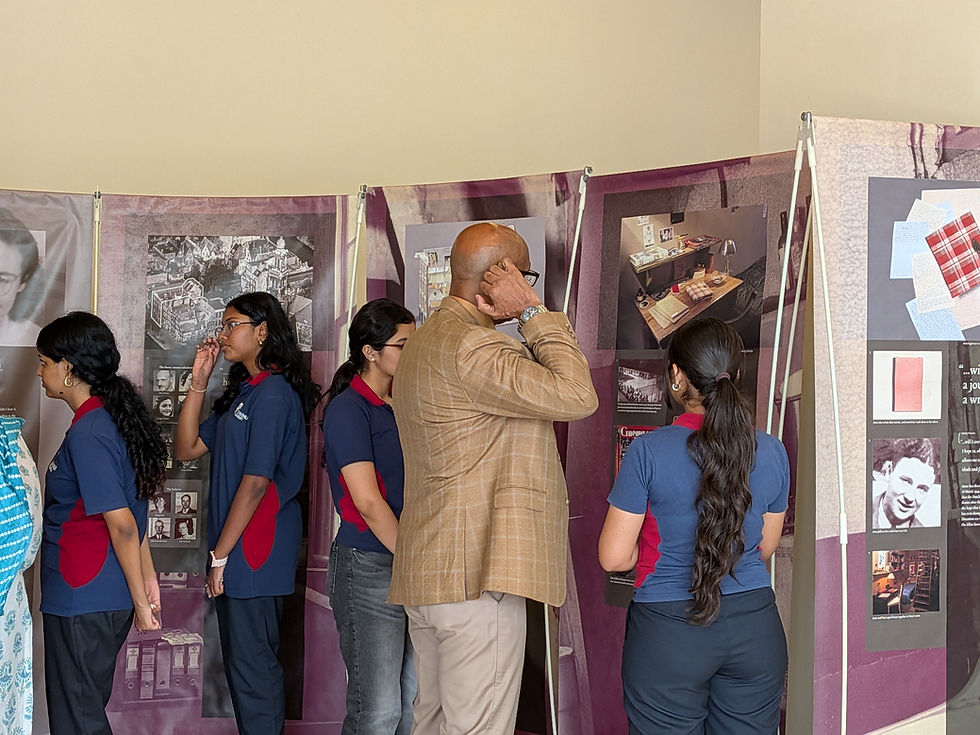- Mayukhi Ghosh
- Jul 7, 2025
- 3 min read
Anne Frank––A History for Today project, developed as an educational initiative by the Anne Frank House, Amsterdam, allies with Peaceworks as its official India partner. On the 23rd and 24th of June 2025, the Peer-Guide Training Workshop was conducted at Vidyashilp Academy, Bangalore.

Thirty-two students ranging from grades 7, 9, 11 and 12 began the workshop with an activity that explored the dangers of ‘labels’ and the divisiveness that often accompanies tags of ‘majorities’ and ‘minorities’. They were asked to put persons with deliberately vague qualifying markers––A Rohingya Student, A Brahmin Shopkeeper, A Bene Israeli Poet, A Dalit Politician, A Manual Scavenger etcetera––into categories of ‘Indian’, ‘Non-Indian’ and ‘Could be Either’. The categories were then switched to ‘Nationalist’, ‘Anti-Nationalist’ and ‘Could be Either’. Did the change in categories cause them to re-think the choice they had made earlier? Did Indian and Nationalist necessarily overlap? Students questioned what defined belonging––a paper trail of citizenship, a history of attachment, a cultural qualification or a religious qualification. They examined if there was an overlap between belonging/un-belonging and those deemed nationalist/anti-nationalist. Who ascribed them such labels? Were they earned labels or assigned? As students discussed the choices they had made in this exercise, they attempted to contemplate what the terms ‘Indian’ and ‘Nationalist’ meant to the persons they had been assigned. Furthermore, students arranged their responses to indicate what place such persons occupied in the social hierarchy of today's India.
This was quickly followed by a background to twentieth-century Germany, where students tried to navigate the murky waters of nationalism, patriotism, belonging and un-belonging in the social clime of constructed identities that blurred racial and linguistic markers to identify Aryans and non-Aryans. Having adequately immersed themselves in the uncertainty in the aftermath of the Great War, the assigned ‘guilt’ that animated Germany’s anger, and explored the waters of rage and hatred that punctuated Anne’s life, students began constructing the exhibit.

Soon, three suitcases and seven tubes had transformed into a labyrinthine display that narrated Anne’s life. After lunch, students viewed the documentary, The Short Life of Anne Frank, that laid bare Anne’s memories, the ordeal their family went through in hiding and upon their capture and made palpable their sense of doom. Students returned from the auditorium and quietly read the panels again. A short demonstration of a walk through the Anne Frank exhibition was done, taking care to emphasize that the audience was not a mute spectator, but an active participant in a deliberation that negotiated how such a time came to pass that evil was no longer deliberate but a mundane reality––banal––and whether the same could be said about evil today.


The morning of the 24th of June 2025, students re-assembled in the hall and were asked: What does peace mean to you? A quick journey across the landscape of war-torn zones where ‘peace’ had been brokered––still reeling under rubble and mourning the loss of loved ones, the scent of death yet pungent and wounds still fresh––seemed like a glaring oxymoron to the notions of peace we discussed.
We discussed how when memory of trauma was abused, victims could just as easily become perpetrators, that Anne Frank’s short life could be remembered as a story of hope that could teach others to be better and escape the violence. This discussion framed the way students interacted with exhibition visitors––questioning, challenging and guiding towards a notion of peace without violence. The exhibition opened on the 24th of June 2025 and welcomed on its first day over a hundred visitors. On the 25th of June the exhibition was open to participants from across Bangalore and students interacted with peers from different institutions, teachers and other visitors.









Comments